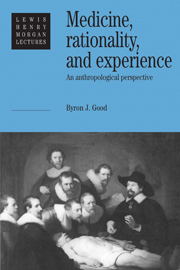Book contents
- Frontmatter
- Contents
- List of figures
- Foreword by ANTHONY T. CARTER
- Preface
- 1 Medical anthropology and the problem of belief
- 2 Illness representations in medical anthropology: a reading of the field
- 3 How medicine constructs its objects
- 4 Semiotics and the study of medical reality
- 5 The body, illness experience, and the lifeworld: a phenomenological account of chronic pain
- 6 The narrative representation of illness
- 7 Aesthetics, rationality, and medical anthropology
- Notes
- References
- Author Index
- Subject Index
Foreword by ANTHONY T. CARTER
Published online by Cambridge University Press: 05 June 2012
- Frontmatter
- Contents
- List of figures
- Foreword by ANTHONY T. CARTER
- Preface
- 1 Medical anthropology and the problem of belief
- 2 Illness representations in medical anthropology: a reading of the field
- 3 How medicine constructs its objects
- 4 Semiotics and the study of medical reality
- 5 The body, illness experience, and the lifeworld: a phenomenological account of chronic pain
- 6 The narrative representation of illness
- 7 Aesthetics, rationality, and medical anthropology
- Notes
- References
- Author Index
- Subject Index
Summary
Byron Good delivered the Lewis Henry Morgan Lectures on which this book is based in March, 1990. This marked the twenty-eighth year in which the Lectures were offered to the public by the Department of Anthropology at the University of Rochester. As I write, the thirty-first Lectures are less than two months away. The Lectures were launched under the leadership of the Department's founding Chair, Professor Bernard S. Cohn, with generous support from the Joseph R. and Joseph C. Wilson families. For twenty-eight years, from 1964 through 1991, the Editor of the Lectures was Professor Alfred Harris. The first five published volumes in the series were Meyer Fortes' Kinship and the Social Order, Fred Eggan's The American Indian, Robert McC. Adams' The Evolution of Urban Society, Victor Turner's The Ritual Process, and Ward Goodenough's Description and Comparison in Social Anthropology.
The Lectures serve in part as a memorial to Lewis Henry Morgan, a prominent Rochester attorney as well as a founder of modern anthropology. Morgan was never dependent on the perhaps dubious pleasures and rewards of an academic position in mid-nineteenth century America. Nevertheless, as Professor Harris noted in his Foreword to Meyer Fortes' inaugural Lectures, Morgan was connected with the University of Rochester from its beginning. A major early benefactor, he left the University money for a women's college as well as his manuscripts and library.
- Type
- Chapter
- Information
- Medicine, Rationality and ExperienceAn Anthropological Perspective, pp. ix - xivPublisher: Cambridge University PressPrint publication year: 1993



